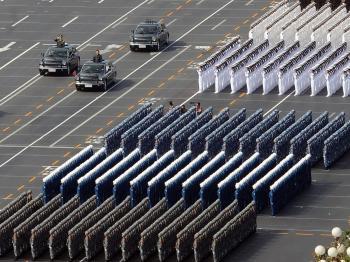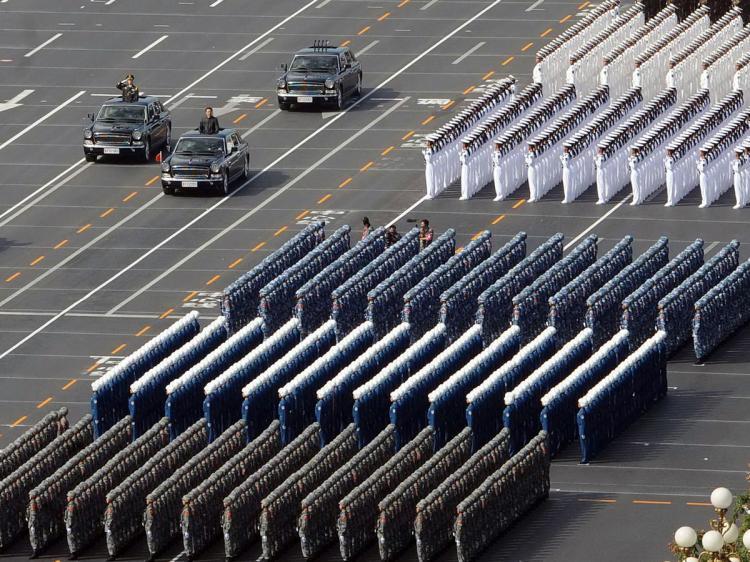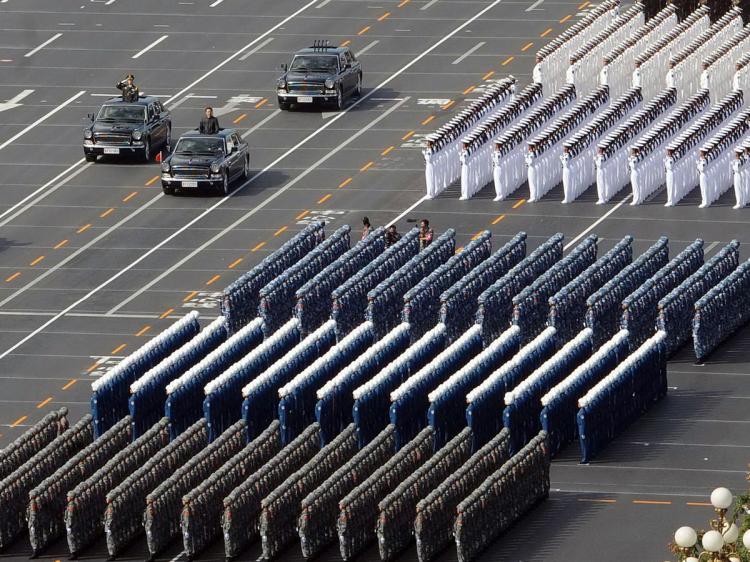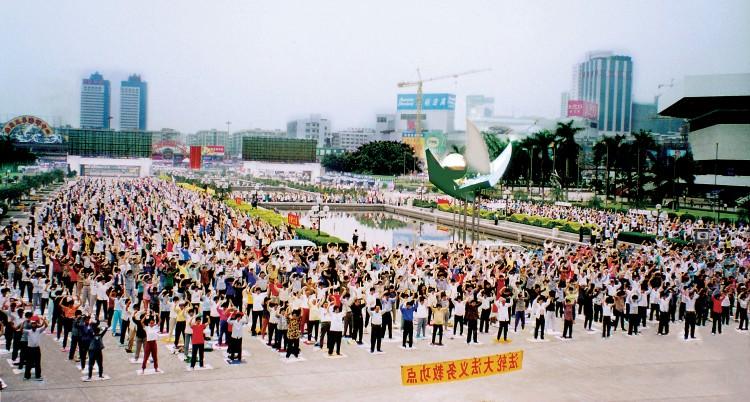The parade in Beijing on Oct. 1 for the 60th anniversary of the establishment of the People’s Republic of China was frightening and spectacular. The preparation reportedly took months of time, thousands of participants, and millions of dollars.
The size of the show was unprecedented, but the theme was the same, and has always been the same: China is better off under Chinese Communist Party (CCP) rule and the Chinese people are very happy about it. At least this is the message that the CCP wants the rest of the world to believe.
However, the significance and function of this parade do not stop here, at least not for the Chinese.
Establishing a Leader
China’s politics is sometimes confusing to the people in the West. Who is the real leader of China? For example, when Hu Yaobang was the secretary general of the CCP and Zhao Ziyang was the premier, you might have assumed they were the top leaders of China. But you would have been wrong. The real leader was Deng Xiaoping, then the chairman of the Central Military Commission. One could tell he was the leader, because he was the one who inspected the military in the parade that occurred two decades ago.
When Zhao Ziyang, then the secretary general of the CCP, wanted to take a more tolerant approach in handling the pro-democracy student movement in 1989, eight veteran Chinese leaders, including Deng Xiaoping, had a meeting in which they determined that Zhao was to be removed from his post. Those eight so-called retired leaders were not even then members of the Central Committee.
This Oct. 1 was a day of the greatest importance to head of state Hu Jintao, who is also the secretary general of CCP. He has been in his current posts for almost six years and had always lived in the shadow of his powerful and exhibitionist predecessor, Jiang Zemin.
Hu has made few changes in Jiang’s policies in areas such as human rights, and has only escalated the Internet censorship and suppression of the people. Hu desperately needed a show that symbolizes his solid establishment as a paramount leader of China today. And he got it. He inspected the military alone, and his portrait was for the first time hung together with the previous paramount leaders of Mao Zedong, Deng Xiaoping, and Jiang Zemin.
The fact that Jiang appeared together with him in the second place on almost every other occasion of celebration, however, inevitably raised again the question: who is the real leader?
Instilling Fear
Military parades of the scale of Oct. 1 have often occurred in countries like communist China, the former Soviet Union, and North Korea. One may wonder if the desire for these demonstrations of solidarity and military power reflects a lack of confidence or insecurity on the part of the regime.
But, there may be more to it. A Chinese student who is very proud of the celebration and the parade stated that Western countries have to be careful when they deal with China today, because China has the military and nuclear power to destroy them if necessary.
The CCP regime has long cultivated in the Chinese the belief that the Western free world is the ultimate enemy to China and the primary obstruction to the agenda of the CCP. Therefore, according to this way of thinking, China must be prepared and ready to take the West on when necessary. And each time China gets a little bit stronger it should let the West feel it. The West may then get scared enough not to interfere with China’s internal affairs, such as the regime’s human rights violations.
Well, if the CCP has not scared the Pentagon, at least they have managed to intimidate and manipulate the people who run the U.S. State Department. For the first time in history, a U.S. secretary of state excused herself from discussing human rights with the CCP regime when she visited China.
There are many Chinese who do not share the belief that the West is China’s enemy. These individuals are normally the potential dissidents and troublemakers for the CCP. The parade is also meant for them. It shows how one could be crushed once declared an enemy of the Party.
In China, the military, armed police, and armed civilians are the defenders of the CCP, not the people. In 1989, the army proved its loyalty when it used tanks and machine guns to crush the pro-democracy students. Since 1999, the security forces have participated in a ten-year-long ongoing campaign persecuting the practitioners of Falun Gong.
The big parade on Oct. 1 is meant to instill fear in the guts and heart and mind of every Chinese. The CCP knows that, without fear, the propaganda will not even work.
Reinforcing False Pride
Millions and millions of Chinese fought with their lives for the democracy and freedom that the CCP once promised when it recruited them. When Mao declared the birth of the People’s Republic of China on Oct. 1, 1949, and announced that the Chinese people had stood up, the Chinese were moved to tears of relief, and joy, and pride.
In the past 60 years, however, after experiencing numerous political campaigns and persecutions, the Chinese people have come to believe that removing the CCP from power is not possible, no matter what the Party has done to the people and nation. It is not possible to elect Party or state officials with one person, one vote. It is not possible to regulate the Party officials with the laws. It is not possible even to have the officials report their real income and assets for the public record. In short, the Chinese people have developed learned hopelessness.
Meanwhile, the Chinese people have continually witnessed that for those who still want to defend their rights and religious or political freedoms, they can get killed, tortured, bankrupted, and expelled from society.
According to the Chinese human right advocates, Internet control has tightened to record intensity; political dissidents and other protesters have been removed or detained; in particular, Falun Gong practitioners across the country were once again secretly taken away from their homes prior to the National Day to become subject to torture and arbitrary sentencing.
The Chinese people fear that such a fate may happen to them; the instinct and desire to survive has overridden any dream for freedom and democracy.
Chinese people are just like everyone else in the world, loving peace and freedom. They are just like everyone else in the world, understanding democracy and capable of implementing it. They have tried for generations and sacrificed their lives for that.
But after 60 years of trying and failing, they have learned that if you want to have peace, your only choice is to keep silent and be obedient to the Party. If you want some kind of safety and freedom, you must join the CCP and became part of it. If you want to be happy and prosper, you should make yourself love the Party and actively participate in the Party’s activities and help implement the Party’s policies.
When these people watched the celebration, they truly felt proud and excited. All the fear and hopelessness was repressed to the unconscious.
The show of force in this celebration reinforces the fear of getting hurt (“see what trouble you can get yourself into?”), a sense of safety (“I am glad that I am not a Falun Gong follower or house church member or political dissident, I am safe”), and the emotional bond and identification with the perpetrator (“Oh, I love the Party, I am very proud of being part of it.”).
For 60 years, the CCP has deeply planted all of the above in the minds, hearts, and guts of the Chinese people and created a nation that suffers from the Stockholm syndrome. And on Oct. 1, the Party had everyone come out onto the street and march to the tune it plays.






